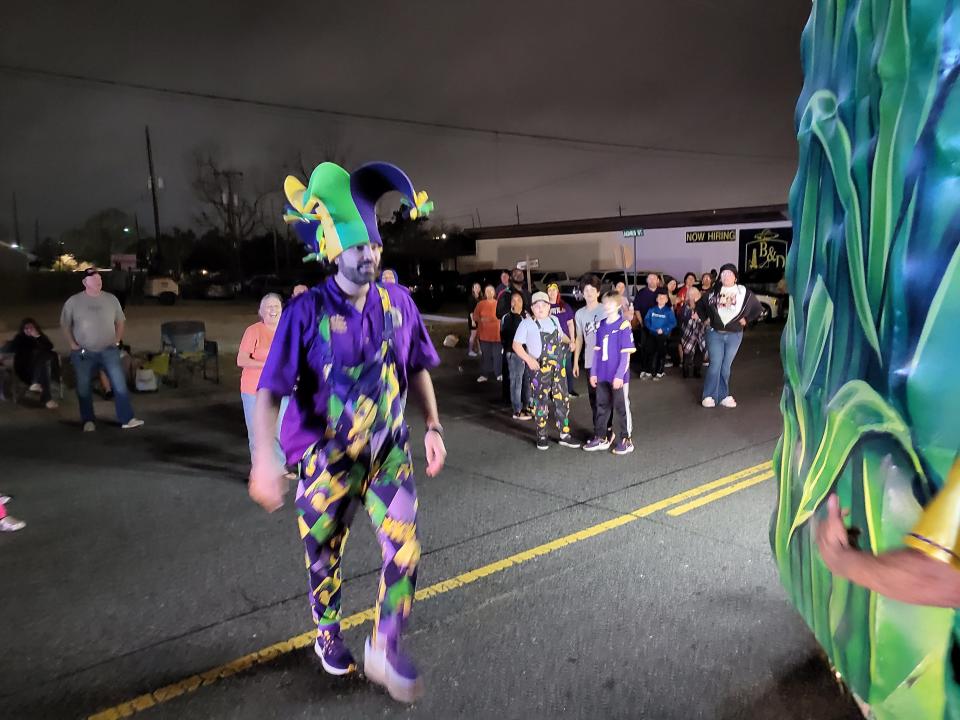More than 5,000 words of a Terrebonne Parish ordinance governing carnival conduct are violated regularly, but few people are charged.
The 2006 ordinance defines what people can bring to Mardi Gras parades the behavior of riders, krewes, and parade goers alike. A violation is a misdemeanor carrying up to a $500 fine and/or up to 30 days in jail.
Authorities say they don't have the manpower to enforce all of the rules. When it comes to parade policing, party fouls are determined by officer discretion.
When Jason Derouen, also known as the Cajun Ninja, leapt from his float this year, he breached the ordinance. Riders are not allowed to exit their floats except during emergencies. The action took place within the Houma Police Department's jurisdiction Feb. 10, but deputies from the Terrebonne Parish Sheriff's Office responded.
Four deputies responded and de-escalated the situation. Collectively, they decided to allow Derouen to continue to ride, rather than remove him from the parade. Derouen has not been charged for his actions, but law enforcement officials say it is not favoritism, it's the norm.
"If the Cajun Ninja would have gotten off there, and those guys would have started punching each other or fighting, that situation would have ended very differently," Terrebonne Parish Sheriff's Office Public Information Officer Blake Tabor said. "If we feel like we can diffuse the situation and have people move on, then oftentimes we are willing to allow that to happen as long as a true criminal act hasn't evolved."
Days later, Derouen apologized for the incident on his Facebook page.
According to Tabor, keeping the public safe and the parade moving is the primary goal. Because of everything going on during carnival season, and the number of law enforcement on scene, memos are kept of everything, and full reports are only filed under extreme circ*mstances.
If an incident seems incapable of being resolved, the offender is given a citation and directed to leave the parade, or if worse, arrested. Law enforcement diffuses the situations to avoid being tied up on minor issues. That way if a major incident occurs, they can respond more quickly.
"We do that plenty of times. It is very hard to police every single activity that happens along a parade route," Tabor said. "I mean, we just don't have those kinds of resources."
When those more serious events occur, such as fighting or other situations, state laws typically apply, and the local ordinance doesn't come into play. The ordinance was only invoked once, in 2020, when a Krewe of Hercules rider disembarked a float.
Rider Steven Naquin left float number 21 during the parade. A parade-goer, Harry Brown, alleged that Naquin attempted to get his 12-year-old daughter's email address. The Terrebonne Parish Sheriff's Office charged him, and Naquin pled no contest and paid $183.50. No contest means he neither pled guilty nor innocent to the charges.
That year, the Krewe of Hercules had other issues as well. There were allegations that riders were throwing dog biscuits and feminine hygiene products during the same parade. Officials from the krewe apologized publicly about the incidents at the NAACP headquarters in Houma. They said they would work with the Parish Government to create laws to govern parade throws.
Dog biscuits and feminine hygiene products are in violation of the ordinance. Both the throws and the rider exiting his float would require a written report from either the Chief of Police or the Sheriff to be delivered to the Parish Council. The council is then supposed to hold public hearings regarding the matter and decide whether to penalize the krewe. According to Council Clerk Tammy Triggs, this never happened.
There are other examples of portions of this ordinance that go uncited, such as glass containers and animals. Both are commonly found on parade routes, and both are illegal.
Glass bottles are not allowed within 500 feet of any parade two hours before or one hour after a parade. This excludes businesses and private residences. Violating this ordinance carries the same penalty as above. The rules on animals are more restrictive. Animals are not allowed within 100 feet of a parade, but the ordinance does exclude service animals.
Houma Police Department Chief of Police Travis Theriot, like Tabor, said it's a question of manpower. He said officers will let people know they have to get rid of glass bottles, or tell them to step onto private property with their bottle, rather than hand out a citation.
"Just because somebody is there with a glass bottle, often we'll just tell them, 'You need to get out of here with the glass bottle.' Because you know you'll have tourists, and people just don't know," Theriot said.
This article originally appeared on The Courier: Terrebonne Parish Mardi Gras parade laws often violated, rarely cited


